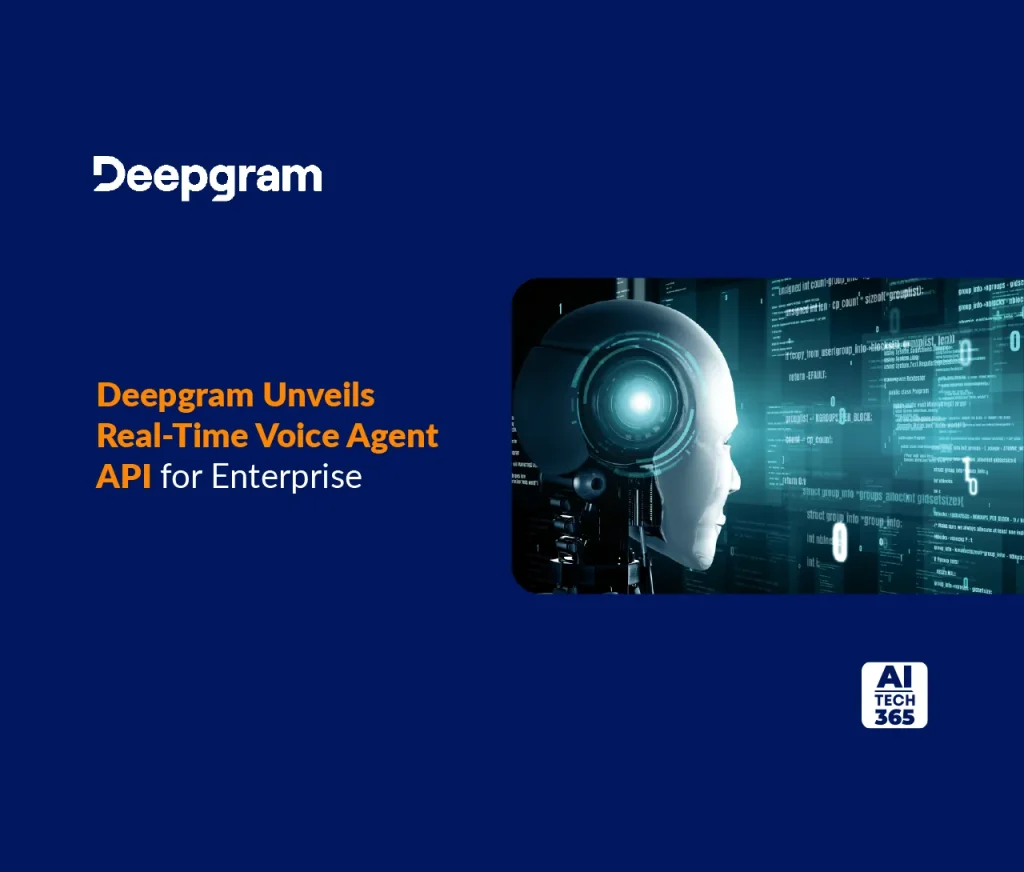Voice Agent API Is Industry’s Only Offering That Delivers The Single, Real-Time API Experience Developers Love, Combined with Full Controllability Enterprises Need. No Need to Stitch Together STT, TTS, and LLM Orchestration. No Black Box Limitations.
Deepgram, a leading enterprise voice AI platform, has officially launched the general availability (GA) of its Voice Agent API—a unified voice-to-voice interface that empowers developers to build intelligent, context-aware voice agents for natural and dynamic conversations. The new API seamlessly integrates speech-to-text (STT), text-to-speech (TTS), large language model (LLM) orchestration, and conversational logic into a single, cohesive architecture.
With the Voice Agent API, developers can either use Deepgram’s native stack—powered by its industry-leading Nova-3 STT and Aura-2 TTS models—or plug in their own LLM and TTS models. This flexibility ensures ease of development without compromising on control, allowing enterprises to deploy scalable, real-time voice agents tailored to their specific needs. Companies such as Aircall, Jack in the Box, StreamIt, and OpenPhone are already leveraging the platform to cut costs, minimize wait times, and enhance customer experiences.
Traditionally, teams building voice agents have been forced to choose between rigid, low-code platforms with limited customization or complex DIY frameworks that demand extensive engineering resources to stitch together STT, TTS, and LLMs. Deepgram’s Voice Agent API eliminates this tradeoff by offering a developer-friendly solution that simplifies deployment while granting full control over orchestration, behavior, and scalability.
Also Read: Acclaro & Unbabel Boost Global AI Translation
“The future of customer engagement is voice-first,” said Scott Stephenson, CEO of Deepgram. “But most voice systems today are rigid, fragmented, or too slow. With our Voice Agent API, we’re giving developers a powerful yet simple interface to build conversational agents that feel natural, respond instantly, and scale across use cases without compromise.”
“We believe the future of customer communication is intelligent, seamless, and deeply human—and that’s the vision behind Aircall’s AI Voice Agent,” said Scott Chancellor, Chief Executive Officer of Aircall. “To bring it to life, we needed a partner who could match our ambition, and Deepgram delivered. Their advanced Voice Agent API enabled us to build fast without compromising accuracy or reliability. From managing mid-sentence interruptions to enabling natural, human-like conversations, their service performed with precision. Just as importantly, their collaborative approach helped us iterate quickly and push the boundaries of what voice intelligence can deliver in modern business communications.”
“We believe that integrating AI voice agents will be one of the most impactful initiatives for our business operations over the next five years, driving unparalleled efficiency and elevating the quality of our service,” said Doug Cook, CTO of Jack in the Box. “Deepgram is a leader in the industry and will be a strategic partner as we embark on this transformative journey.”
Streamlined Development and Quicker Time to Market
Building voice agents from scratch involves much more than integrating STT, TTS, and LLMs. Teams must manage real-time audio streaming, detect speech endpoints, coordinate responses, and maintain conversational flow—all while ensuring low latency and handling interruptions. Most APIs offer partial solutions, often requiring custom logic for real-time interactions, which slows down development and increases complexity.
The Voice Agent API resolves these challenges with a fully integrated interface that includes built-in support for dynamic conversational behaviors such as turn-taking and barge-in detection. Developers can focus on delivering impactful user experiences without managing fragmented tools or infrastructure. For broader use cases, Deepgram’s partner ecosystem—including Kore.ai, OneReach.ai, and Twilio—offers access to enterprise-ready conversational AI services powered by Deepgram.
Full Control and Enterprise-Grade Flexibility
Beyond ease of use, Deepgram’s API grants granular control over real-time interactions and system performance. Built on Deepgram’s Enterprise Runtime, the solution supports advanced orchestration features and full model ownership, enabling precise adjustments to latency, behavior, and scalability.
Key features include:
-
Flexible Deployment Options: Run the complete voice AI stack in cloud, VPC, or on-premise environments to meet enterprise compliance and performance standards.
-
Runtime-Level Orchestration: Enable dynamic behavior adjustments through mid-session updates, real-time prompts, model switching, and event signaling.
-
Bring-Your-Own-Model Compatibility: Integrate custom LLM or TTS models while still benefiting from Deepgram’s orchestration and real-time coordination infrastructure.
“Deepgram gives us the flexibility to bring our own models, voices, and customize behavior while controlling how we build and orchestrate our voice agents,” said Harshal Jethwa, Engineering Manager at OpenPhone. “Their system seamlessly handles the complexity of real-time voice coordination, letting us focus on creating exactly the experience we want.”
This integrated design translates into superior performance. According to recent Voice Agent Quality Index (VAQI) benchmarks—which measure latency, interruption rate, and response coverage—Deepgram scored the highest overall. It outperformed OpenAI by 6.4% and ElevenLabs by 29.3%, proving the effectiveness of its unified and model-driven approach.
Cost-Effective and Scalable Voice AI
In addition to control and performance, the Voice Agent API is designed for cost efficiency at scale. Customers using Deepgram’s end-to-end stack benefit from a simple, predictable pricing model at $4.50 per hour, consolidating costs across the pipeline and enabling straightforward budgeting for large-scale deployments.
For organizations that choose to integrate their own LLMs or TTS systems, Deepgram provides built-in rate reductions, ensuring a lower total cost of ownership without sacrificing speed or quality.
“Deepgram’s Voice Agent API stands out for its technical prowess, affordability, and flexibility, making it the smart bet for customer service voice AI,” said Bill French, Senior Solutions Engineer at StreamIt.

